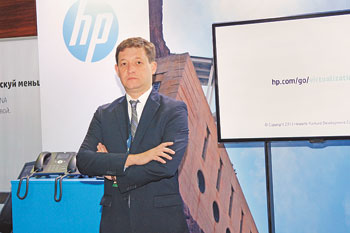ASTANA – Sanzhar Kettebekov was born in Kazakhstan and founded his company, Segment Interactive, in Silicon Valley. He has been involved in several startups involving modern interactive technologies and was part of a research team nominated for Discover Magazine’s Award for Technological Innovation. He has a PhD from the University of Pennsylvania, and is a research scientist at the MIT Computer Science and Artificial Intelligence Lab. He has also worked on emergency management system of the Port Authority of New York and New Jersey, and is involved in the development of technologies to study abnormal behavior in psychiatry and neurology (Harvard Medical School) and gesture-speech interfaces.

Sanzhar Kettebekov, CEO of Segment Interactive company.
What does your company do?
Our company is engaged in applied technologies for processing user behaviour to increase the effectiveness of online advertising; that is, we estimate the cost of displayed advertising for the user. This is new technology, introduced based on a new direction called cognitive analytics: the synergy of mental simulation and artificial intelligence. Practically, we forecast the level of user attention for each viewing, based on his or her behaviour. The U.S. market is very dense and it is hard to get access there. In order to do this we, offer a niche solution.
At the same time, our company is aimed not only at the U.S. market, but also at the global market. We have already presented our technology in Russia. I hope that in the near future we will work in Kazakhstan as well.
The theme of your presentation at the conference was “Behavioural analytics is a gold mine.” What makes this so promising?
This is the next level of technology. It has replaced technology designed for speedy processing of data. At this stage, we focus on the psychology of people, on human relationships or transactions in which the person is a constituent element. This is done to optimise the process. In principle, we try to understand the psychological status of the person and offer him on that basis something he can consume at that moment.
In Kazakhstan, to give an impetus to the development of the IT sphere, startups are provided with various incentives and preferences in the Park of Information Technologies. What is it like doing business in Silicon Valley?
There is no such support and everything is encouraged by commercial interest. When technologies pay off, private capital fulfils what is here the role of the government. Therefore, relationships there are based on the benefit and capital.
There is an acute shortage of personnel in the IT area in our country; high-level professionals go abroad. What steps do you think we need to take to attract them to the domestic industry?
It is necessary to create an ecosystem that provides adequate funding and critical mass of personnel. You probably need to speed up this process, involving experts from abroad and at the same time developing domestic specialists, thereby creating the critical mass that will allow people to stay here. The problem is that you do not have companies like Mail.ru and Yandex in the IT field. Although in Kazakhstan there are such companies, Kazakhtelecom, for example, that have resources and are in need of personnel, you need more companies that are interested in attracting staff.
How is a strong staff supported in the U.S.?
By demand for these specialists. Competitiveness is also one of the main conditions of our company. Personnel determine almost everything.
You were involved in the selection of startup projects organised by the Foundation for the Development of ITC. How would you characterise the quality of the projects?
Frankly speaking, most of them are raw both in technological and business terms. Their competitiveness leaves much to be desired. The fact is, Russian, Belarusian and Ukrainian companies are already present in Kazakhstan and the CIS market is open. And a startup developed in Kazakhstan should be competitive in the CIS space. This is the main challenge and at the foundation we will focus our efforts on it.
Submitted projects will pass several stages. At the first phase, the projects will be accelerated: we will develop an adequate business model and identify key technologies. A group of experts, including Western specialists, will be engaged to help the startups, which will determine their competitive direction.
Then the projects that have passed the initial screening and proved their viability and effectiveness will reach the stage of incubation. At this stage, the group of experts will focus on some niche markets.
Of course, these startups will not be supported by seed capital, as in the case of acceleration, but by the specific infusion of venture capital, possibly corporate sponsorship by national companies such as Kazakhtelecom, Kcell and others; this is the way the foundation provides financing for newly minted companies. This process will begin with the ICT Development Fund and, I hope, will spill into other areas. Indeed, the ICT will become an engine for innovation.
